Greetings, book people! Cookie Extravaganza is in full swing. Here’s what my kitchen looks like this week:
This is the second of three special December newsletters, and it’s for all the nonfiction lovers out there: the best nonfiction I read in 2022! This list is a bit less queer than my fiction list, with 26 queer books (65%). This reflects a trend in my overall reading: I read more non-queer nonfiction than non-queer fiction. The world is vast and there’s so much to learn and discover! I didn’t used to read nonfiction at all, and I’m so grateful that’s changed. These books have opened my heart and brain in countless and lasting ways.
My Favorite Reads of 2022: Nonfiction
Some notes on the list:
It includes the best books I read in 2022, not just books published in 2022.
It’s organized by moods and themes instead of genres.
It includes poetry, because my brain sorts poetry as nonfiction, even though it isn’t always.
It includes 40 books. I make the rules; I can make a Best Of list that includes 40 books if I want to!
You can browse through all these books via this handy list on Bookshop.
Clicking on a title will bring you to Bookshop. Clicking on linked text in the description will bring you to my review.
Books marked with an asterisk are ones I loved on audio.
There are several books here I didn’t review for the newsletter. In some cases, it’s because I just didn’t get to them. In other cases, it’s because I’m planning to write longform reviews/essays about them in 2023. I loved them all.
It’s only December 9th, so this list is not definitive! If I read any more favorites in the next month, I’ll be sure to tell you about them in January.
Enjoy!
Honoring Queer Ancestors
The Cancer Journals by Audre Lorde: What I cherish most about this classic book, as with all of Lorde's work, is the way she models how to use language in service to her whole self, her radical vision. She uses words to make herself bigger, to resist smallness, compartmentalization, one dimensionality. She is a writer whose language I feel in my body, whose language seems to live in her body.
We Are Everywhere by Matthew Riemer and Leighton Brown: I read this beautiful photo book from cover to cover and I’m glad I did. It’s an amazing photo archive of queer resistance, but it’s also an engaging and detailed history of 20th century queer protest movements. I learned a ton.
We Both Laughed in Pleasure by Lou Sullivan: I haven’t reviewed this one yet because I still haven’t found the words. It feels too precious, too close. It’s my favorite nonfiction read of the year, no question. It's funny and sexy, full of yearning and mess and hilarity and joy and a million contradictions, because that's what life is made of. It's impossible, reading a book like this, not to think about how many queer and trans elders we lost, how many queers did not live long enough to become elders. Sullivan has left us with this incredible record of his life, and while I'd trade it all away for him to be living happily in gaudy gay retirement somewhere, for all the queer elders who did not survive the 1980s and 1990s to be here, I’m immensely grateful for the gift.
On Writing
Aug 9—Fog by Kathryn Scanlan: Where does the urge to write down our lives come from? This is a five-year diary kept by a woman in her 80s in a small town in Illinois in the late 1960s. Scanlan found it at an estate sale and transformed it into this book. It’s ordinary and beautiful. Thinking about it, this line from Sappho plays over and over in my head: “someone will remember us / I say / even in another time”.
Body Work by Melissa Febos: This is a craft book about writing memoir, but it’s also about the stories we tell ourselves and the ones the world tells us. It’s a gentle, smart, wise manual for the hard, healing work of breaking out of the narrow white supremacist heteronormative narratives all around us and writing (living, telling) our own.
Ongoingness by Sarah Manguso: As someone who’s kept a journal since I was 12, this biography of a journal spoke right to my heart. But it’s also about motherhood, change, letting go, and navigating the lines between living and recording.
Queer Love Notes
Care Of by Ivan Coyote: During the first year of the pandemic, Ivan Coyote responded to some of the letters they’d received over the years, special ones they’d been saving. The result, this book, is wise and funny, overflowing with trans and queer joy, a bit of warmth to hold in your hands.
*Lost & Found by Kathryn Schulz: Exquisite writing about grief and love, intertwined.
Your Emergency Contact Has Experienced an Emergency by Chen Chen: Chen Chen’s work is some of the most queerly playful I’ve ever read. He takes play seriously, makes it sacred. In these pages there is heartbreak and fury and despair and longing and a whole lot of serious reckoning. But alongside all of that: exuberant joy, delighted silliness, languid pleasure. Beautiful queer play. Soft queer love. Fierce queer hearts. Hot queer bodies. Wild queer imaginings. Absurd queer dreams. This book is a gift that holds my broken heart as it breaks.
Let’s Smash Genre
Making Love with the Land by Joshua Whitehead: This is a beautiful book of essays—though as Whitehead explores in one piece, “essays” isn’t the word, and perhaps there isn’t a word in English for the kind of work he’s doing here. It’s about kinship and grief and covid and language, about the theory and practice of Indigenous literatures, about Whitehead’s previous work, about the violences/confines of genre, about disordered eating and sexual violence and healing.
Antiman by Rajiv Mohabir: A beautiful memoir about language and diaspora and queerness and home. The structure is especially brilliant—there are poems, prose poems, lyric essays, transcribed songs, short vignettes, journal entires. There’s also so much beautiful language blending. Mohabir moves between Hindi, English, Creole, and Guyanese Bhojpuri.
Double Melancholy by C. E. Gatchalian: This book is impossible to describe. I’ve never encountered anything quite like it. If you’re up for something singular and uneasy and messy, these 134 pages of complicated thought are worth your time and then some.
Voice of the Fish by Lars Horn: Writing. Tattoos. Gender. Art. Being trans. Water, water, water. Losing language, being bereft of language. Where language lives, and what it means to live without it. Masculinity. Trauma. Fish. Lots of weird historical stories about fish. Philosophy. Illness. Memory. Bodies.
Monster Portraits by Sofia Samatar and Del Samatar: I read this weird little book in a day, and though it didn’t go onto my Best Of the Year list at the time, I haven’t been able to stop thinking about it. It’s a collection of writings and drawings about monsters. Is it fiction? Memoir? Mythology? Poetry? Literary history? Yes. It’s such a fascinating exploration of monstrosity—how we talk about monsters, how monsters are portrayed in pop culture, the racist history of monsters, what it means to identify as monster.
Year of the Tiger by Alice Wong: This isn’t just a memoir—it’s guidebook and an archive, a collection of disabled wisdom and jokes, a life story, a reference manual, a portal into the future. It’s an incredible collection of essays, interviews, podcast transcripts, photographs, comics, tweets, letters and emails, graphics, recipes, commissioned art, and puzzles.
Required Reading
Belly of the Beast by Da'shaun L. Harrison: An essential read about the intersections of anti-Blackness, anti-fatness, and transphobia. Much (all) of the scholarly writing about anti-fatness until now has centered fat women. Harrison begins to fill a gaping hole with their focus on fat Black men, transmasculine, and nonbinary people. They go far beyond body positivity, exposing the violence in schools of thought that rely on individual experience and personal acceptance/transformation, rather than the systemic oppression of fat, Black, trans, queer, and disabled people. They delve into the ways that anti-fatness supports the carceral state; the links between white supremacist beauty standards, desirability politics, and the policing/devaluing of fat bodies; and the racism and transphobia behind so much discourse about health, especially in relation to fatness. It is challenging and scholarly and deeply felt.
*South to America by Imani Perry: An essential history; a deep dive into Southern politics, food, geography, language, art, culture, and history; a personal story about leaving and homecoming and family and roots; a collection of interviews and visits; a reckoning with racism and white supremacy; a call to action; a celebration.
Notable Native People by Adrienne Keene: Beautiful portraits and short profiles of 50 Indigenous people—artists, actors, politicians, activists, scientists, healers, farmers, athletes, and so many more. It’s a short but illuminating read.
Wonderment
*An Immense World by Ed Wong: Nature is outrageously incredible. Outrageously.
The Hurting Kind by Ada Limón: Ada Limón never disappoints. This book is full of joy and heartache. It’s mostly about the natural world—birds, trees, weather, seasons—and what it means to be a human in the natural world: looking at it, feeling it, destroying it, loving it, becoming part of it.
The Spectral Wilderness by Oliver Bendorf: In addition to gorgeous queer love notes and poems about being trans, this book is full of astonishing writing about farming. Every line gutted and lifted me.
At the Pond edited by Daunt Books: I’m in the middle of writing a longer essay about this book, but in the meantime: oh, how I loved it. It’s a collection of essays about the Kenwood Ladies Pond, a public swimming pond for women in Hampstead Heath in London. I am a swimmer, so I was expecting to love this book, but I didn’t anticipate just how deeply it would move me. The essays are all written by people who swim at the pond, but they are remarkably different from each other. Everyone has a particular relationship with the pond and with swimming. It’s a complex celebration, an ode to swimming and community that doesn’t ignore the messier pieces of both.
*Vanishing Fleece by Clara Parkes: This book is pure joy—a celebration of craft, handwork, folk traditions and folk art, and process. Clara Parkes, who is a yarn reviewer and general wool person, spends a year documenting the journey of a 676-pound bale of wool. She traces its transformation from wool to yarn—shearing, cleaning, spinning, dyeing. Along the way she visits farms, ranches, and various wool processing facilities all over the country. It’s an absolutely fascinating look at the American wool industry.
One-Sitting Reads I’ve Been Thinking About for Months
Hot, Wet, & Shaking by Kaleigh Trace: The queer disabled sex book you didn’t know you needed!
The Face: A Time Code by Ruth Ozeki: Ozeki looks at her own face in the mirror for two hours and writes about it. It’s not boring. It’s a beautiful mediation on Asian American identity, art, and the people and histories that shape us.
Dancing After TEN by Vivian Chong and Georgia Webber: A memoir about illness, blindness, art, and all the possibilities that open up when you ditch the myth of arrival (even though doing so is hard and painful).
People Change by Vivek Shraya: Change! It’s what life is made of! It’s not the enemy! Transformation is magical! Humans are not static! Endings are not failures and past versions of ourselves are not lies! This book is a balm.
We Will Not Cancel Us by adrienne maree brown: Compassionate and urgent wisdom for all of us living, working, loving, and building movements in these internet times.
Complicated Geographies
*Easy Beauty by Chloé Cooper Jones: Disability and motherhood and travel and academia and beauty. Beauty standards and ableism and internalized ableism. Exhaustion and friendship and pop culture. Ancient Rome and Beyoncè and tennis. It’s a gorgeous, messy, seeking, seething knot of a book.
Messy Roots by Laura Gao: A coming-of-age memoir about being a queer Wuhanese American before and during the pandemic. A complicated ode to Wuhan, China, and the Bay Area, and Texas, and the ways these places have defined Gao’s life. Gorgeous art, lots of reckoning.
Another Appalachia by Neema Avashia: A gorgeous book about place and home and belonging.
Dark Tourist by Hasanthika Sirisena: Absolutely dazzling essays! They’re about Sirisena’s Sri Lankan heritage, her childhood in the South, American imperialism, disability, art, gender, queer culture. Every one is a knockout.
In Sensorium by Tanaïs: This is a gorgeously intimate and nuanced history of South Asia told through the lens of scent and perfume. Diaspora, queerness, language, stories and myth-making, colonial violence, survival. A winding, unending journey.
Then the War by Carl Phillips: It’s hard to pinpoint exactly what I love so much about Phillips’s work. It’s formal and philosophical, but also inventive and accessible. It’s full of yearning and pondering. He writes beautifully about nature, queer love, sex, and mysteries. Reading Phillips feels restful to me, even as I work to untangle all the knots he ties.
Motherhood
Choosing Family by Francesca T. Royster: A gorgeous memoir about Black queer motherhood, Black Chicago, the work of family-making, partnership. Mark your calendars for February 7th!
The Breaks by Julietta Singh: A beautiful book-length essay about queer parenting at the end of the world. Queer family-making, queer architecture. Illness and lineage, hope and despair.
Linea Nigra by Jazmina Barrera, tr. Christina MacSweeney: This is a journal of fragments and moments and musings, a motherhood reckoning, a baby diary. It’s rich and layered, full of the work of so many artists and writers, a beautiful exploration of self, parenthood, pregnancy, birth, being a daughter, art-making.
Destroyed Me
Ducks by Kate Beaton: This is a memoir that will haunt me for the rest of my life. It’s about sexual violence and toxic masculinity and a complicated, contradictory, irreducible place: the Alberta oil sands. Beaton captures so many truths at once inside this book; it’s an absolutely breathtaking story.
*Know My Name by Chanel Miller: I waited a long time to read this book, and I’m so glad I finally did. It’s incredibly clearsighted. The surety, honesty, directness, vulnerability, and anger with which Miller tells this story is remarkable.
Alive at the End of the World by Saeed Jones: Poems about being Black and gay and a writer at the end of the world. Poems about grief and living inside it. Poems about laughing in the middle of grief. Poems about everything that’s broken, and moments of wholeness.
One more regular newsletter (sort of) is coming to you next week, and then, a week from today, a very special announcement to close out the year! I’ve been working on something for 2023 that I cannot wait to tell you all about. In the meantime, come talk to me in the comments about the best nonfiction you read this year!




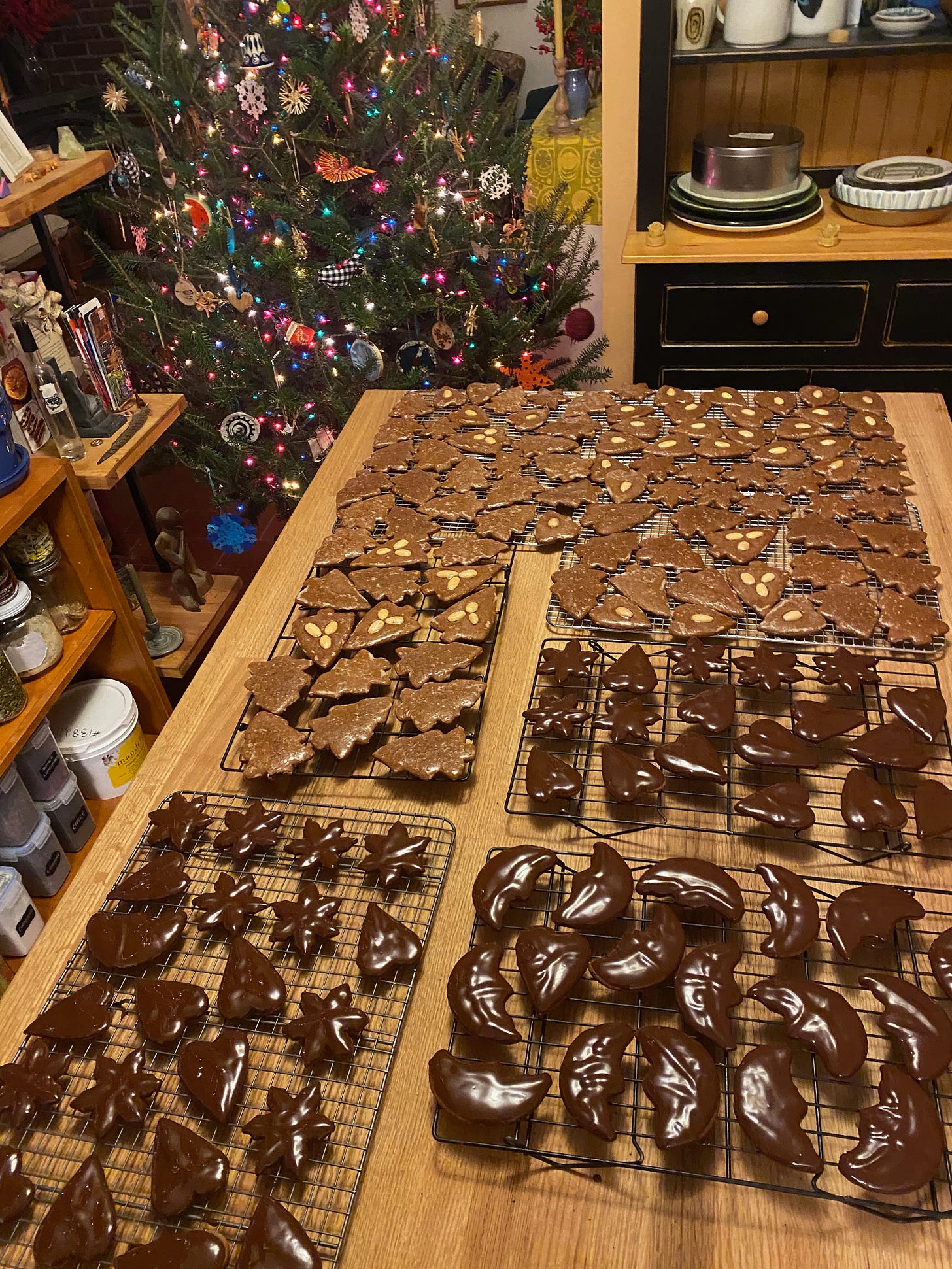

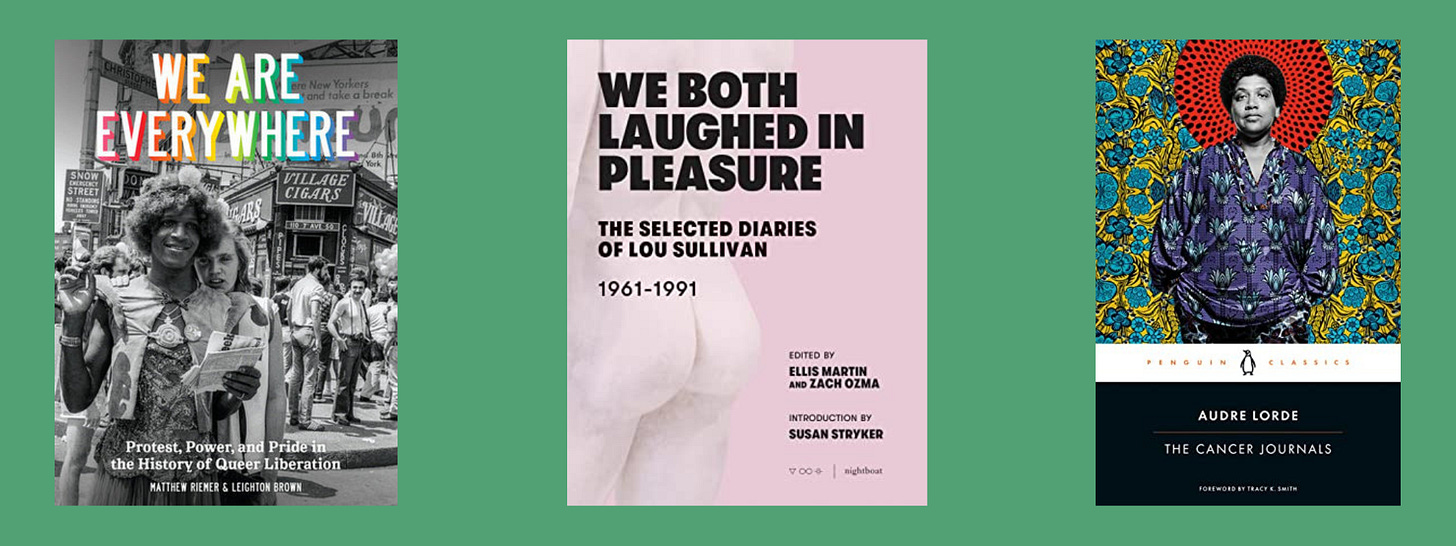
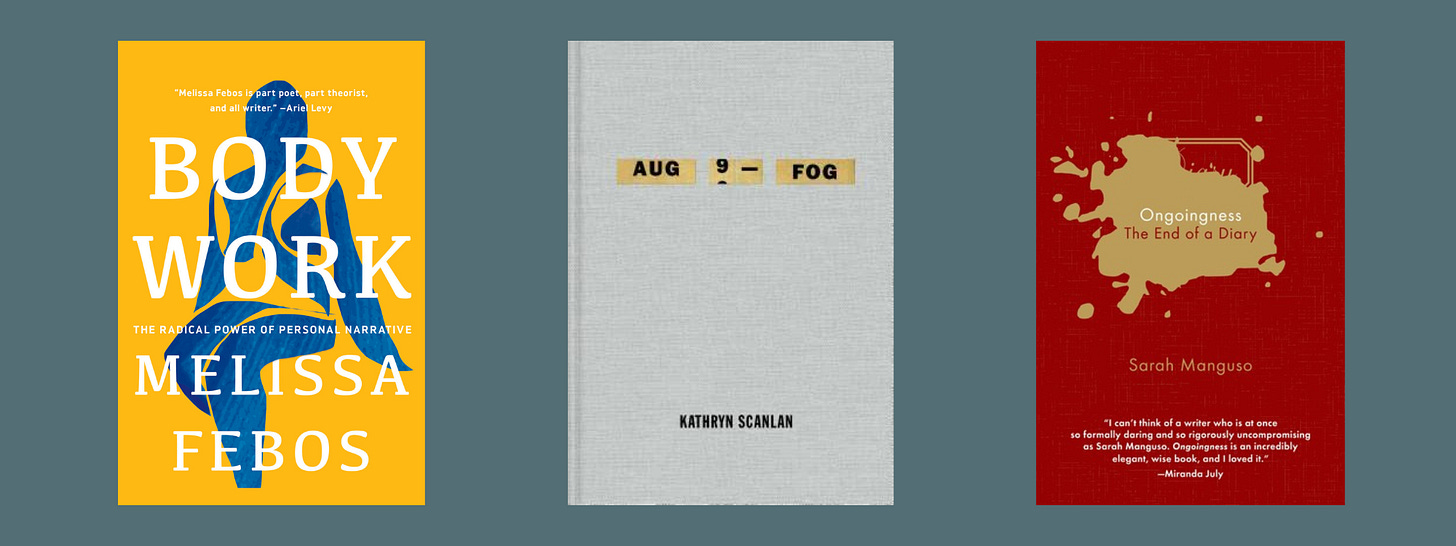

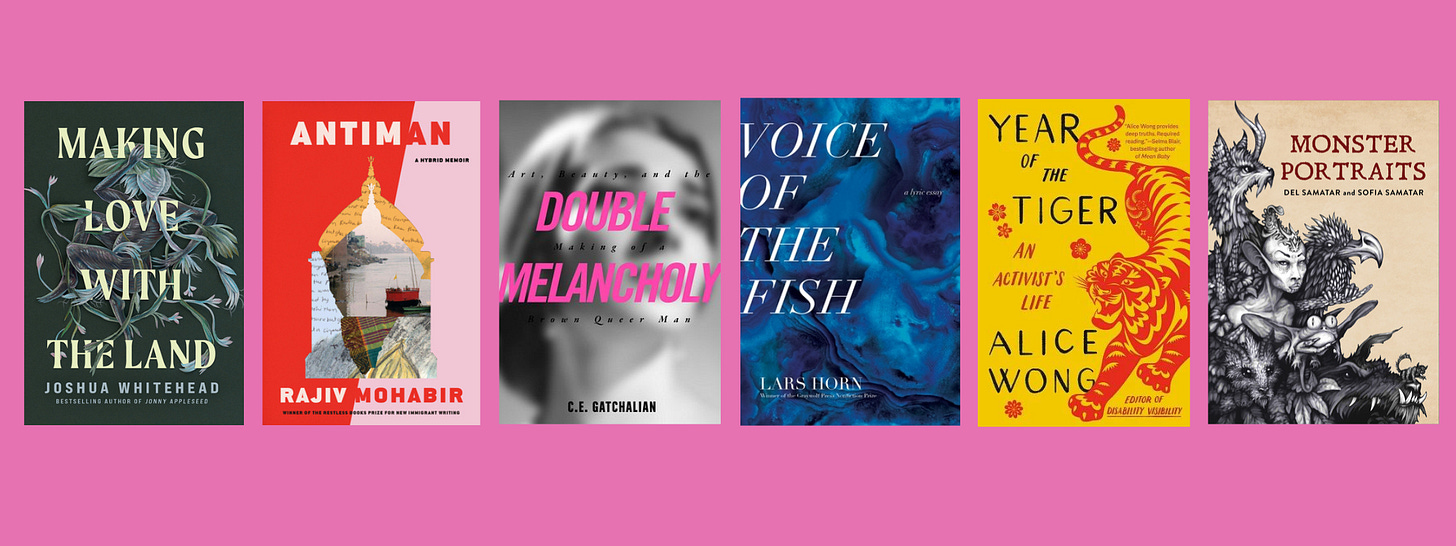

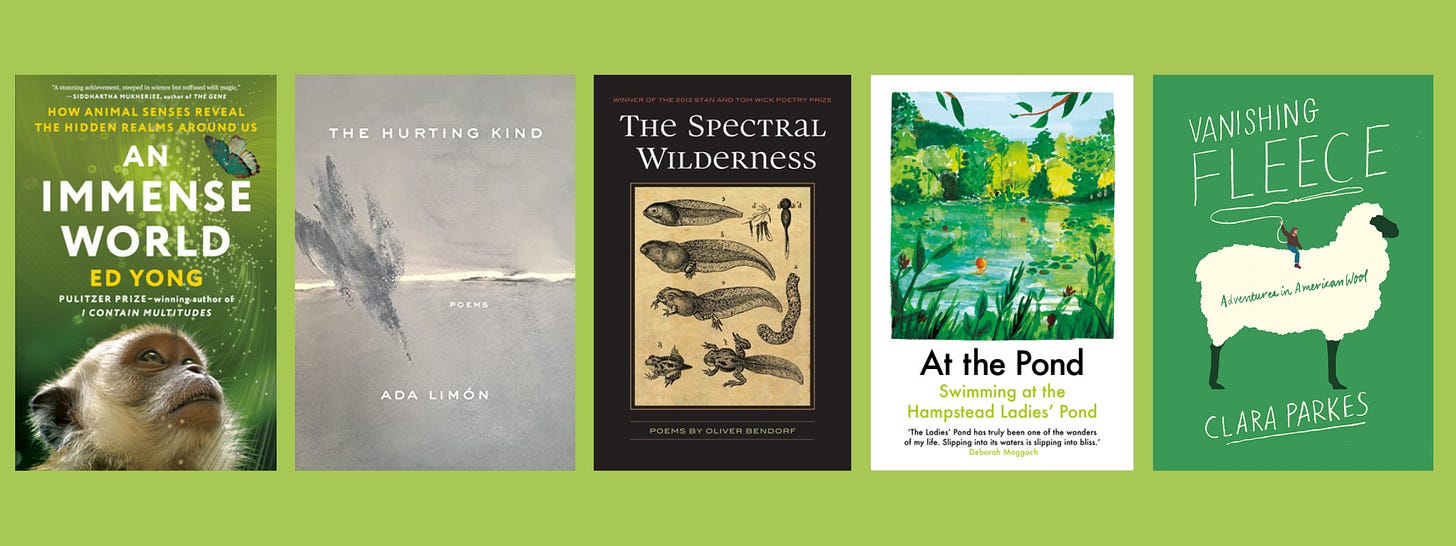




Claire the minister at Follen gave a sermon on Lost and Found and said it was one of the most beautiful books she had ever read. I just reserved it at Cary. I did not remember you had reviewed it.
Thanks for putting this together!